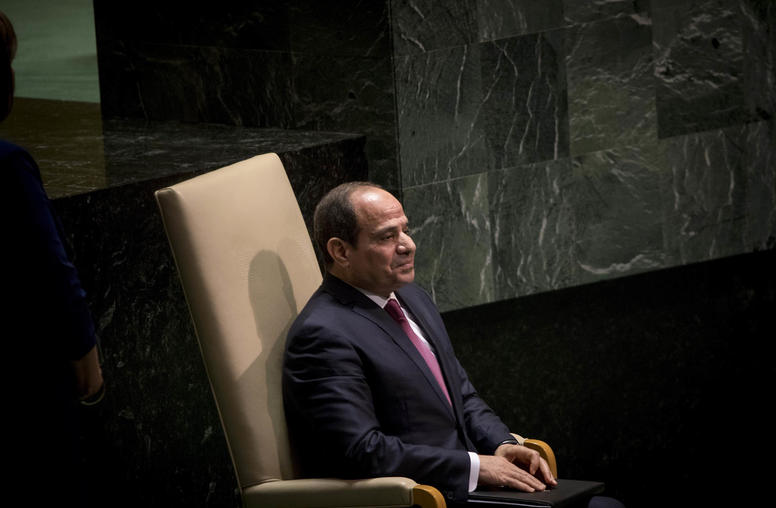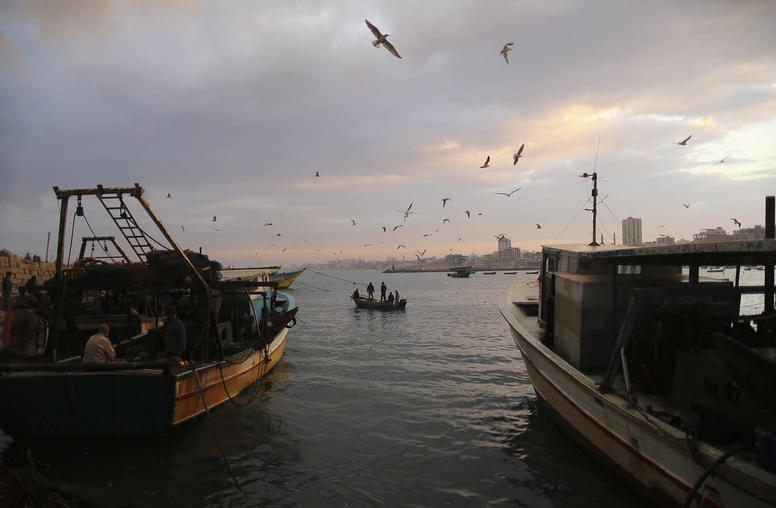The Arab Awakening and its Aftermath: How to Shape the Path Ahead
USIP's Steven Heydemann moderates a discussion about the Arab Awakening with the Institute's Stephen Hadley and the Carnegie Endowment for International Peace's Marwan Muasher.

ARAB SPRING TO WINTER: SHAPING THE MIDDLE EAST – If the U.S. is to have any chance of shaping the Middle East in the wake of the Arab Awakening, it must stay engaged and it must pay attention, said USIP’s Steve Hadley at a USIP-organized breakfast at the Reserve Officers Association’s headquarters on Capitol Hill. “There is a role for us to play and it is in our interest to play that role,” Hadley said. USIP is organizing a series of early morning events in cooperation with the ROA, beginning with a one-hour discussion on January 18 between Hadley, the former national security adviser under President George W. Bush and now a senior adviser for international affairs at USIP, and the Carnegie Endowment for International Peace’s Marwan Muasher, a former foreign minister of Jordan. The conversation was moderated by USIP’s Steven Heydemann.
HADLEY: DON’T FEAR RISING ISLAMISM – Hadley, like Muasher, believes the revolutions across the Arab world last year offer tremendous opportunities - and challenges. But many western international experts and policymakers, political leaders and others fear the rise of Islamism across the Arab world. Much of that fear stems from the expectation that Islamism is by definition extreme. While that is not true in many cases, it doesn’t mean those new regimes will be necessarily friendly to the U.S. But be not afraid, Hadley cautioned. “We’re going to have to recognize that this is the Arab world. Most of them are followers of Islam, and most of them will rise to power as Islamist powers,” Hadley said. “We should not despair, that is not the end, just because they are Islamists.” Finding effective ways to work with these new governments will be key, and building partnerships with countries whose policies we won’t likely always like will be tough. How will they govern? How will they manage their foreign affairs? What kind of partnerships will they seek? Most of those questions remain unanswerable for now. But the U.S. has few options but to engage. “It’s going to require us taking a step back and say, ‘what alternative do we have?’” Hadley said.
ISLAMISM IS NOT MONOLITHIC – The rise of Islamist countries since the Awakening began last January is not akin to the power held by other Islamic groups such as Hamas, Hezbollah or even al-Qaida, Muasher noted. And they are by no means monolithic parties. “Political Islam is not monolithic,” Muasher said. But nor are they are pluralistic. “They have not been committed to pluralism,” he said.
WHAT CAN THE U.S. DO TO SHAPE ISLAMIC MOVEMENTS? While the influence the U.S. can have in the region will be limited, the consensus within the American government is that it will seek to guide Arab countries emerging from autocratic rulers as much as possible. Heydemann asked Hadley and Muasher what the U.S. could do to achieve its objectives in the region. Engagement is key but also persuasion, Hadley said, referencing a point Muasher made. “I think Marwan makes the most important point,” Hadley said. “We’ve got to encourage the Islamist parties to recognize that over the long term, the future is in establishing a pluralistic society in which everyone can participate in the reform and restoration of society – an open political system.”
A CAPITAL IDEA – One way the U.S. can help influence history in the region is by planting economic seeds to bolster the middle class in some of these countries while there still is opportunity. Hadley believes one idea for engaging a country such as Egypt is to identify five universities, five corporations and five foundations to form a sort of exportable partnership of 15 entities from the West that could train Egyptians in “21st Century skills” and then commit to hiring some number of those it trained. It could help Egypt to see the economic opportunities for itself as well as build good will. “It’s a small thing, but it would send a message that the international community is looking out for them,” Hadley said.
MUASHER: A TWO-STATE SOLUTION SERVES ISRAELI INTERESTS – The discussion touched briefly on the Arab-Israeli peace process and neither Hadley nor Muasher are optimistic. Most experts agree that there will be very little political capital spent by the U.S. during the election year, allowing any momentum to flounder. While many believe that a two-state solution between Palestinians and Israelis doesn’t favor Israelis, Muasher disagrees. “Ironically, today a two-state solution is not in favor to Arabs or Palestinians only, it is crucial to the survival of Israel,” he said.
HADLEY’S FEARS – Any delay in a peace process will worsen significantly the chances for peace in the region, Hadley said. “My fear is that progress, which is the best hope for a Palestinian state… will be lost,” Hadley said. “And the West Bank will start in a downward spiral of violence,” he said, noting that for him, the priority is to keep the peace process “alive” until the parties are in a position politically to take steps toward a peace agreement.
STRATEGIC PATIENCE – In the end, nothing the U.S. does or does not do will affect change there quickly. But, Hadley said, “we should not underestimate how much influence we have. We stand for freedom and democracy and this motivates and inspires the movements,” he said. But, it will take time. “We have to have strategic patience,” Hadley said. “This is going to take a long time, we have to stay focused and pay attention.”
Explore Further
- A Year of Turmoil
USIP Event | January 18, 2012 - The Arab Awakening
As the dramatic events of the Arab Spring turn to the more mundane yet vital work of governance, constitution writing and peacebuilding, USIP is on the ground, bringing its unique brand of action and expertise to the effort.



